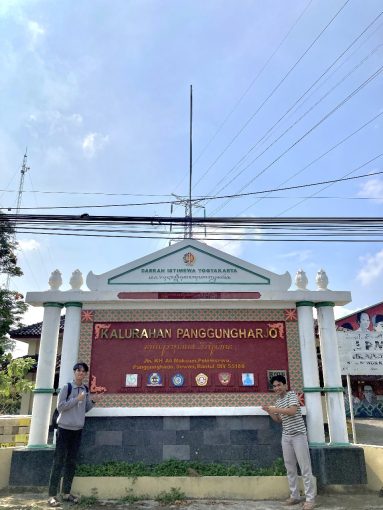
Yogyakarta, May 2nd 2024─Student Creativity Program (PKM) is a program of the Ministry of Education, Culture, Research, and Technology (Kemendikbudristek) for students to develop and apply their knowledge in society. This year, as many as 11 teams from the Faculty of Social and Political Sciences UGM have passed the PKM funding stage with various research titles. One of the teams led by Muhammad Faiq Fauzan from the Department of Social Development and Welfare (PsDK) conducted research in Panggungharjo sub-district, D.I. Yogyakarta.
According to Faiq, the research was motivated by the importance of bureaucracy in every government implementation, including at the village level. Especially with the issuance of the Governor Regulation of D.I. Yogyakarta No. 40 of 2023 concerning Village Reform, Faiq and his team hypothesized the effectiveness of the policy. “We realized, will this step really be effective in its implementation? It is an open secret that in the implementation of bureaucratic reform in kalurahan there are several problems including financial management that is prone to waste, challenges in managing human resources, inadequate regulations, poor work ethic, and the gap between expectations and reality in the results of bureaucratic reform,” said Faiq.
Panggungharjo sub-district was chosen as a pilot project for the implementation of bureaucratic reform. Through this research, Faiq and his team want to learn how to criticize a policy properly and systematically. The final results of the research will be a progress report, final report, social media content and policy brief. In particular, this policy brief will be used as a reference and recommendation for the Regional Development Planning Agency (Bappeda) of D.I. Yogyakarta Province to implement its policies. The research with the title Towards Advanced Villages: Measuring the Effectiveness of Bureaucratic Reform Bureaucracy Reform in Panggungharjo Village, Yogyakarta Special Region, will be executed immediately after officially passing the funding selection.
Faiq’s team consists of 5 students from different study programs. He admitted that the challenges in his team arose because the members were very active in various other activities. They had difficulty organizing time to gather and discuss because many of their schedules collided with other schedules. However, this did not dampen their enthusiasm to continue fighting in this PKM event. Kafa Abdallah Kafaa, S.Sos., M. A., a PsDK lecturer and supervisor admitted that he was proud and happy because the Faiq Team passed. “Of course I am very happy, considering their extraordinary struggle, morning, noon, and night struggling with this research proposal. Alhamdulillah, the results are proud to be able to pass the national funding stage,” he said.
Kafaa explained that the main challenge in this research is actually the execution in the field. According to him, there will be situations and conditions where the team will have to apply the right strategy and improvise to complete the research. To face these challenges, Faiq and his team need strong commitment and solidarity with each other. “Considering that they are also studying, active in organizations, and so on, maybe a little or a lot of these activities will have an impact on the team’s performance. So, this must really be maintained so that the fire of enthusiasm continues to burn and create a truly solid team,” explained Kafaa.
In addition to Faiq’s team, 10 other proposals from the students of FISIPOL UGM also officially received national funding from the Ministry of Research and Technology. This achievement is certainly a pride for students and Faculty of Social and Political Sciences UGM in their works. In addition, this achievement is considered as a form and commitment of FISIPOL in realizing the 4th Sustainable Development Goals (SDGs), namely quality education. Through this activity, students are expected to learn and work with valuable experience outside the lecture bench.
